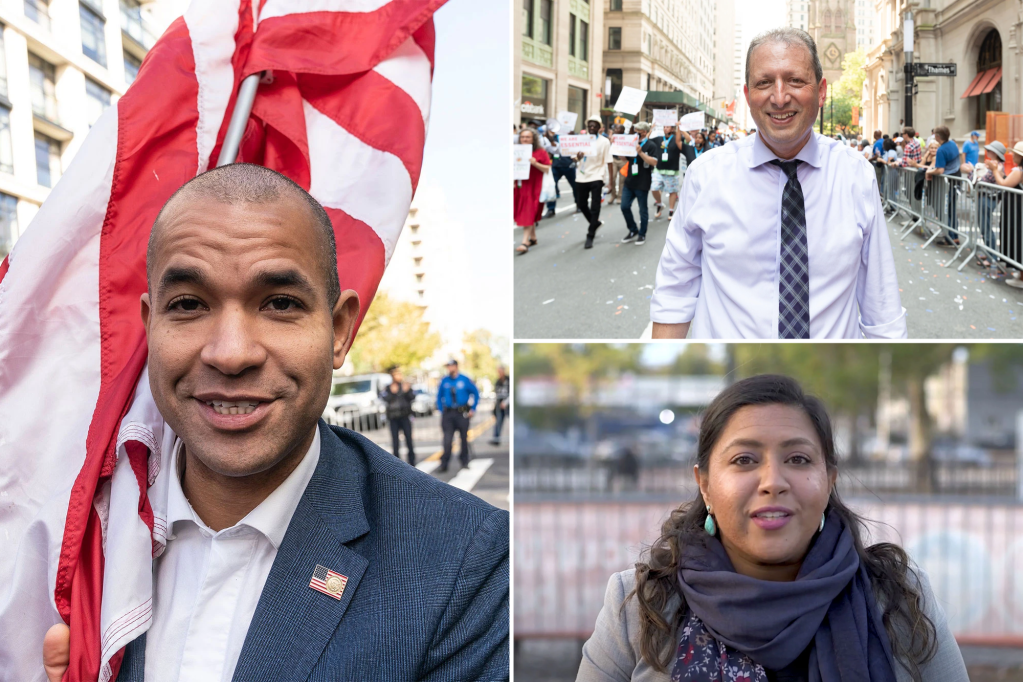[ad_1]
New Yorkers are set to head to the polls Tuesday to pick the Big Apple’s next mayor and formalize many largely decided City Council races — but there’s also five amendments to the state constitution to vote on.
Nearly 170,000 New Yorkers have already cast ballots during early voting — and thousands more are expected to vote by absentee as well.
But for all those traditionalists waiting to vote on Election Day, the polls across the five boroughs will open at 6 a.m. and close at 9 p.m.
Mayor
The Democratic nominee, Brooklyn Borough Eric Adams, is facing off against the Republican nominee, Curtis Sliwa. The outcome will decide who controls the Big Apple’s $98.7 billion budget and 300,000-plus workers who staff its agencies.
Adams is an ex-cop who served as a state Senator in Albany before becoming BP. Sliwa is a longtime media personality and radio talk-show host in New York City, who came to fame founding the controversial civilian patrol group, the Guardian Angels. He is also running on the Independent line.
Comptroller
The Democratic nominee, Brooklyn city Councilman Brad Lander, is squaring off against Republican Daby Carreras. The Comptroller’s office is a powerful position: it must approve all city contracts, manages the city’s pension funds and has the power to audit city agencies.
Public Advocate

The Democratic nominee — incumbent Jumaane Williams, a former city councilman — is facing off against Republican Devi Nampiaparampil. The Public Advocate office is a high profile position with relatively few powers, including being able to introduce legislation in the City Council but they cannot cast votes.
City Council
There are 51 seats on the City Council, but only a few of the contests are expected to be competitive in the heavily Democratic Big Apple.
District 32 (Queens): Whoever wins, it’ll be history! Queens County Republican chairwoman Joann Ariola is seeking to hang onto the seat currently held by termed-out GOPer, Councilman Eric Ulrich. She faces stiff competition from Democrat Felicia Singh, a teacher in Ozone Park. Either candidate would be the first woman to represent the district on the Counci, while Singh would also be the first minority.

District 48 (Brooklyn): The party lines are blurred in the fight to replace former Councilman Chaim Deutsch, who was booted from City Hall after pleading guilty to charges of tax fraud. The Democratic nominee, Steve Saperstein, ran as a Republican for the City Council in 2017 and the Assembly in 2018. His Republican opponent, Inna Vernikov, was once a registered Democrat.
District 50 (Staten Island): The fight to replace termed-out Republican city Councilman Steve Matteo might be tightest in the city. The Democratic nominee, former city Councilman Sal Albanese, is duking it out with GOPer David Carr. Albanese has racked up endorsements from 40 unions, including all the groups representing police and firefighters, giving him a shot to steal a seat long held by Republicans.

Borough Presidents
All five borough presidencies are on the ballot too, however just the Staten Island race looks to be competitive.
Disgraced former congressman Vito Fossella is seeking to revive his political career as the Republican nominee for the largely ceremonial role after he left office in 2008, following a drunk driving arrest in Virginia that set of a chain of disclosures that eventually revealed a second family. He’s facing off against Democratic nominee, lawyer Mark Murphy, the son of ex-Rep. John Murphy, who was convicted in the infamous Abscam sting operation in the 1970s.
Constitutional Questions
- Proposal #1: A ‘yes’ vote would fix the number of state Senators at 63; remove requirements that one redistricting commission’s co-executive directors come from Democratic Party and the other from the Republican Party; and nix the rule that at least one member of each major party (the Democrats and Republicans) support newly drawn maps in order for them to be approved. A ‘no’ vote would maintain the commission ‘as-is’.
- Proposal #2: A ‘yes’ vote would establish a right to clean water, clean air, and a healthful environment in the state constitution. Some transit activists have said they’re voting ‘no’, suggesting it could give neighborhood activists opposed to bike lanes, busways and denser housing a new tool to tie up projects in court.
- Proposal #3: A ‘yes’ vote would lift the prohibition on registering to vote within 10 days of an election, allowing state lawmakers to implement same-day voter registration. A ‘no’ vote would keep the rule.
- Proposal #4: A ‘yes’ vote would nix provisions in the current constitution that mandate New Yorkers must be unable to appear at the polls by reason of absence from the county or illness or physical disability in order to qualify for an absentee ballot — giving state lawmakers the option to expand voting by mail permanently. A ‘no’ vote maintains these requirements in the state constitution.
- Proposal #5: A ‘yes’ vote would move civil claims cases of up to $50,000 to Civil Court, currently the cap is $25,000. Good government groups say it would help clear the case backlog in state Supreme Court. A ‘no’ vote would keep the current limit.
[ad_2]
Source link








